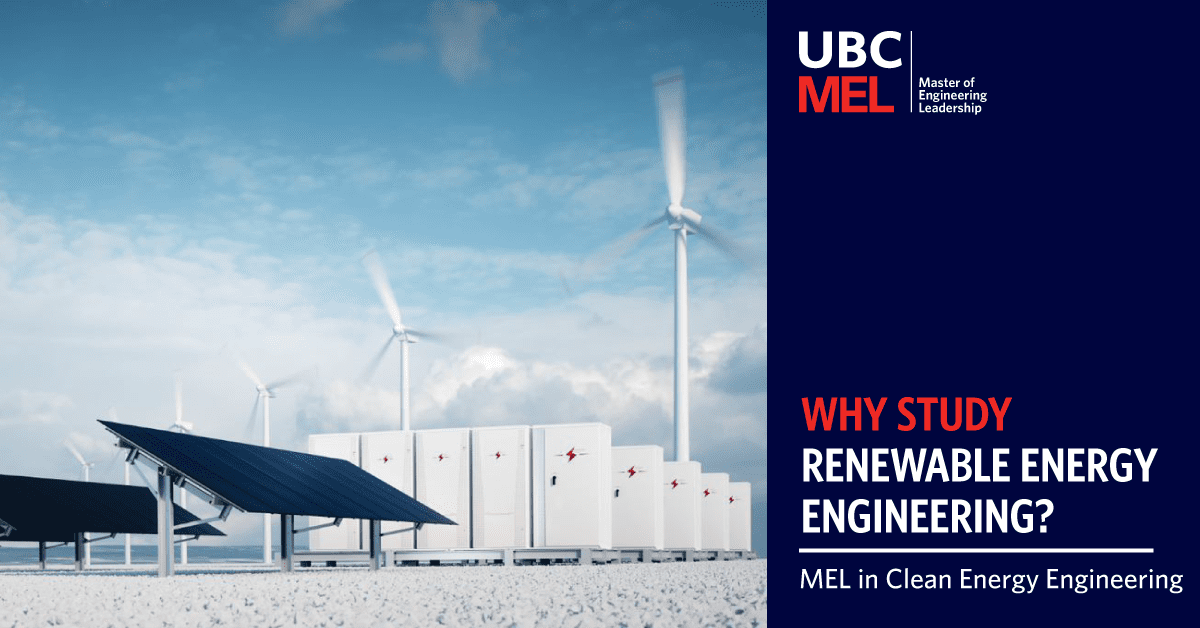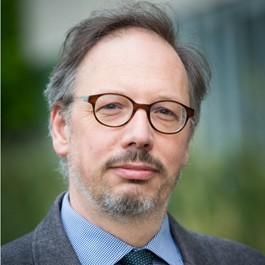Why study renewable energy engineering?

The need for sustainable energy engineers has never been greater. Our world is facing a climate emergency, and there is an urgent need to develop and scale-up renewable energy technologies and systems while also finding ways to reduce energy consumption across all areas of the economy.
Professionals with expertise in alternative energy engineering are in high demand in industry and the public sector.
If Canada (or indeed, any country) is to even come close to meeting its commitments under the Paris Agreement, we need to adopt a multipronged and holistic approach that embraces innovative ways of generating, transmitting, storing and conserving energy.
And that’s where a new kind of engineer can make a difference: someone who understands the complex interconnections that influence the energy sector and who has the leadership skills to guide new projects, influence decision-makers and take action to build a clean energy future.
“What separates the Master of Engineering Leadership in Clean Energy Engineering program from others is our belief that the ability to develop and implement the scope of technical solutions needed to achieve change requires a new kind of professional,” says Program Director Dr. Vladan Prodanovic.
“They must be excellent communicators. They need to know how to listen to a community, and how to convey complex ideas to the general public, organizations and policy makers. They need an understanding of business strategy and change management.”
A curriculum focused on sustainable energy engineering
The MEL in Clean Energy Engineering offers an interdisciplinary curriculum that equips students with these and other skills. Students explore alternative energy systems (including hydro, wind, solar, tidal and other emerging technologies), energy storage and transmission, energy management, and the importance of energy policy and economics.
Courses are taught by world-renowned experts in their field from UBC’s Faculty of Applied Science.
Dr. Prodanovic says that the learning outcomes of these courses enable students to “understand clean energy technologies in terms of the principles behind them, the resources they need to work, their outcomes and the viability of implementing them in specific settings.”
Preparing students to be renewable engineering leaders
Being an engineering leader requires much more than technical expertise.
Leaders in sustainable engineering need an understanding of business, strategy, innovation, analytics, accounting, project management and more.
“Leaders need to consider the larger picture and the longer term, and to inspire others to do the same,” says Dr. Tony Bi, director of the world renowned Clean Energy Research Centre and MEL instructor who teaches a course on energy system fundamentals.
“The MEL helps students develop this way of thinking, and the business courses that make up 40% of the curriculum provide a useful foundation in communication, accounting and cost-benefit analysis.”
Students broad-ranging business knowledge through courses taught by UBC Sauder’s Robert H. Lee Graduate School, one of the world’s top-ranked graduate business schools. In these courses, students explore case studies, engage in lively conversation and work together in interdisciplinary groups.
An intense three-week course in the summer delves into six core business competencies, including accounting, organizational behaviour, finance, marketing, business technology management and professional development.
Renewable energy system capstone projects
Students in the MEL in Clean Energy Engineering complete a capstone project where they work closely with an industry partner to develop an innovative solution to a complex technical and business challenge.
Recent projects have included modelling scenarios for remote First Nations communities that want to switch from diesel power to renewable energy sources, evaluating the feasibility of powering mine sites with renewable hydrogen, and exploring the costs and benefits of installing renewable energy sources and cutting energy consumption in a diesel-powered community.
Capstone projects can play a pivotal role in students’ development, enabling them to make important industry connections and gain work experience in a new area.
Some students have received job offers from their capstone industry partners, while others have used the experience as a springboard to launch the next phase of their career.
Advancing into leadership positions in green energy engineering
Graduates of the MEL in Clean Energy Engineering are in high demand in industry and in the public and not-for-profit sector.
Some students, like Carlie Owen, have used the degree to transition out a successful career in the oil and gas industry to work in a field more aligned with their values. (Carlie is now working as a consultant to support government decision-makers on how to make the shift to decarbonization).
Others have gone on to explore entrepreneurial ventures, including launching a company that designs and installs residential solar energy systems, while others are working in the public sector.
Government policies are also creating demand for alumni. “Many graduates of this program are hired as energy managers,” says Dr. Tony Bi.
“In BC, for example, the provincial government has mandated that every sector has a decarbonization plan, and our students are highly in demand to apply their skills to help organizations and municipalities identify their overall decarbonization potential and advise on strategies to reach those goals.”
Start your future as a sustainability engineer
The MEL in Clean Energy Engineering was designed for professionals who want to make a difference in the world by deepening both their technical and their business knowledge.
As described in our article Engineering a more sustainable world, all courses are taught through a sustainability lens so that graduates are equipped to develop and implement solutions that are technically feasible, make economic sense and contribute to the social and environmental good.
As Dr. Bi points out, about 80% of Canada’s greenhouse gas emissions come from the energy sector. “If we are serious about decarbonization,” he says, “this is where we need to focus”.
If you are serious about building your technical and leadership skills so you can make a tangible difference in the world, the MEL in Clean Energy Engineering could be for you.
Clean Energy Engineering
Develop the technical, business and leadership skills needed to generate sustainable energy solutions.
Read MoreFeatured Faculty and Staff

DR. ANTHONY LAU
Application Deadlines
The online application portal for the January 2025 has closed.
Get ready to apply!
Admissions for the 2026 intake will open on January 1, 2025.
How to ApplyJoin us for an
Info Session
Sign up for our latest online information sessions and discover what our programs have to offer.
Sign Up NowFeatured Faculty and Staff

DR. VLADAN PRODANOVIC
"UBC is a great place for students, who also benefit from the university’s excellent connections across the globe."
Featured Alumni

Carlie Owen
Carlie Owen says the MEL in Clean Energy Engineering was a life-changing experience that helped her set a new professional direction. She’s now working as a consultant supporting government decision-makers in the shift to decarbonization.
Clean Energy Engineering
Develop the technical, business and leadership skills needed to generate sustainable energy solutions.
Read More

